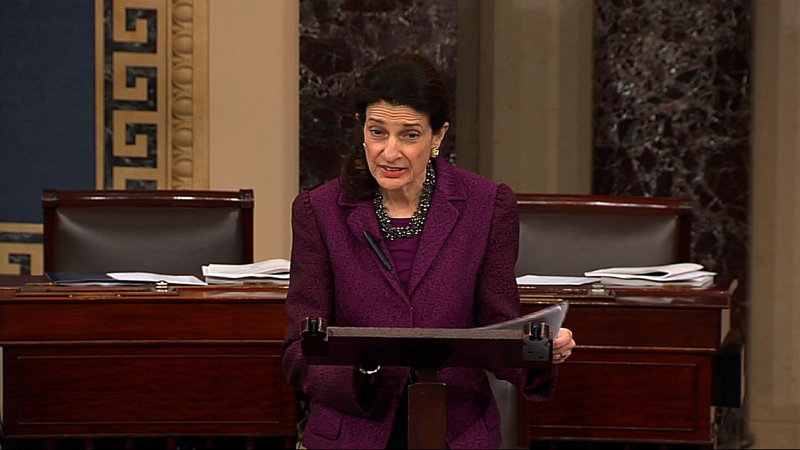WASHINGTON – For years, Maine and Nebraska have been Electoral College oddities thanks to their ability to award electors to more than one presidential candidate.
But the nation’s two vote-splitting states may soon have company.
Lawmakers in Pennsylvania, Michigan, Wisconsin and Virginia — all states that voted for President Obama but have large, Republican-leaning rural populations — are pushing to switch from winner-take-all to a system in which one Electoral College vote is awarded to the victor in each congressional district. The other two electors would go to either the statewide winner or to whomever captured the majority of the congressional districts, depending on the model.
(Electoral College refresher: The number of presidential electors given to each state is determined by how many representatives it sends to the U.S. House and Senate).
Maine has never split its electors during the 40-plus years since voters switched to the system. Nebraska has only done it once — in 2008, when President Obama won one elector and Republican Sen. John McCain captured the other four, but without consequence to the overall election.
Things would be much different in larger states that are more purplish than solid-blue Maine and deep-red Nebraska, however. And that could make all the difference in a close election.
Virginia, for instance, awarded all 13 of its electors to Obama on Friday when Congress formally tallied the Electoral College votes. Had Virginia been using the Maine model, Obama would have won just four votes while Republican Mitt Romney would have walked away with nine.
Vote-splitting has been a non-issue in Maine. It would prove more contentious in Pennsylvania or Ohio, where voters in large metropolitan areas helped carry the state for Obama despite support for the Republican in rural areas.
Already, some opponents have labeled the proposals “Electoral College gerrymandering,” a reference to the age-old practice wherein Democrats and Republicans redraw congressional district lines to maximize the party’s chances of sending their candidate to Congress.
SNOWE CASTS LAST, LATE VOTE
Sen. Olympia Snowe has cast thousands of votes during the nearly 3½ decades she represented Maine in the U.S. House and Senate.
Her final roll call came just before 2 a.m. on New Year’s Day after weeks of political fighting had led the country to the edge of — and then slightly over — the so-called “fiscal cliff.”
“I think it’s sort of a fitting conclusion to my career,” she said with a shrug and a tired laugh.
Snowe, a Republican, and 88 other senators had moments before voted in support of the compromise bill. The House followed suit nearly 24 hours later but not before disagreement within Republican ranks threatened to scuttle the deal.
Standing just outside the Senate chamber with husband and former Maine Gov. John McKernan, Snowe said the drawn-out process that led to passage of the bill was emblematic of the frustrations that drove her to retire.
“It says it all,” she said.
KING ON THE NATIONAL STAGE
Sen. Angus King is once again getting national media attention as he takes his seat in the Senate.
King was featured in a segment aired on “NBC Nightly News” on Thursday, the same day King was sworn in to the Senate. Former longtime NBC anchor Tom Brokaw conducted the interview with King and his wife, Mary Herman, in Brunswick. The town itself also received significant airtime in the piece.
King, an independent who is caucusing with the Democrats, once again pledged to strive to bring a more collaborative approach to Capitol Hill.
“I’m not arrogant enough or naive enough to think that Mitch McConnell and Harry Reid are going to say, ‘Tell us how to do this, Angus,'” King told Brokaw. “But if I can nudge it a bit toward rules that make sense, I think that will be an accomplishment in itself.”
Maine’s junior senator is also slated to appear on NBC’s “Meet the Press” on Sunday.
OVERHEARD ON THE HILL …
King’s wife, Mary Herman, got a bear hug from Vice President Joe Biden on Thursday during a re-enactment (for cameras) of the swearing-in ceremony.
As she stood between the two men holding the Bible, Herman asked Biden whom she should look at, according to the all-seeing and all-hearing C-SPAN coverage. The easygoing Biden, who seemed to be enjoying Thursday’s ceremonies more than anyone, replied with a smile: “Whoever you want to. I’d rather you look at me, but you can look at him.”
Herman looked at her husband.
Washington Bureau Chief Kevin Miller can be contacted at 317-6256 or at:
kmiller@mainetoday.com
On Twitter: @KevinMillerDC
Send questions/comments to the editors.



